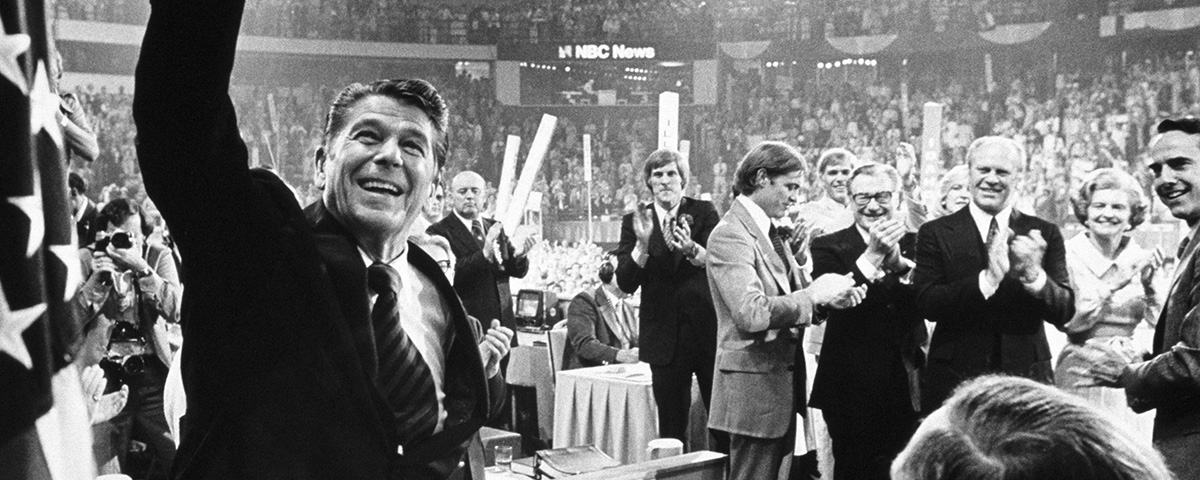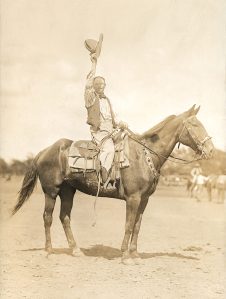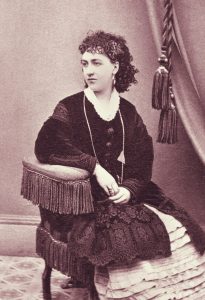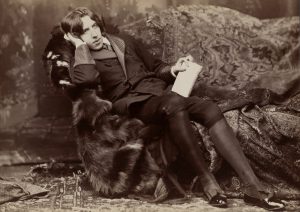CONSERVATIVES IN MODERN America face a chronic problem in running for office. Often believing government to be the enemy, they have to explain to themselves and others why they want to join that enemy. Some seem to agonize; others exhibit only mild compunction. But eventually most arrive at the lesser-evil theory: that if they don’t run and get elected, liberals will, to the further detriment of the national interest.
Gerald Ford wasn’t a liberal, but in 1975 Ronald Reagan decided Ford wasn’t conservative enough to remain in the White House. That’s what Reagan told himself, at any rate. And had he been younger, that might have been the whole truth. But at 64, Reagan was already very old by American political practice. Only William Henry Harrison had been older at election than Reagan would be in November 1976, and Harrison died a month after inauguration. Reagan assumed he couldn’t wait until Ford stepped aside; if he would achieve the presidency, it was 1976 or never.
So he ran. It was a desperate move rather than a smart one. The odds were against him, and the hazards were large. Presidents, even unelected presidents like Ford, have power. They command the attention of the national media without having to strain or pay for the coverage. They can make appointments that please allies and constituents. They can arrange appropriations that secure the loyalty of influential members of their party. As a result they typically control the machinery of the party, which writes rules for primaries and conventions. They can rely on the patriotic reflex of most Americans when the national interest is threatened and, if adept, can convert that reflex into political support.
For Reagan to defeat Ford would require him to overcome these incumbent advan-tages. For Reagan merely to challenge Ford risked splitting the party. Rarely had a sitting president faced a challenge from within his party, and in nearly every case that party had lost the presidency. If Reagan challenged Ford, and if the Republicans lost, Reagan would be blamed.
But he went ahead nonetheless. He tacitly approved the formation of an exploratory committee in the summer of 1975, and the committee discovered intense interest in a Reagan candidacy. Conservatives in the Republican Party had distrusted Nixon, and many delighted in his downfall. Watergate accomplished something the conservatives had been vainly attempting for more than a decade: to discredit moderation in the party. Conservatives remained a minority among Republicans, and until Nixon self-destructed, they seemed to be losing ground rather than gaining it. Watergate came as a gift, something they couldn’t have foreseen, and they itched to take advantage.
Reagan was their man. His rhetoric remained as conservative as ever, and now that he had completed his term as governor of California, he could put aside the pragmatism that awkwardly undercut his words. He stumped California and the country during the early autumn of 1975 recycling the speech that had launched his political career in 1964, when he supported ultra-conservative Barry Goldwater as the GOP nominee. It was as satisfyingly unspecific as ever, and it allowed him to blame America’s ills on the federal government without detailing which parts of government he would shrink or eliminate.
ON NOVEMBER 20 he got into the game. At the National Press Club in Washington he declared that he was challenging Ford for the Republican nomination in 1976. “Our nation’s capital has become the seat of a buddy system that functions for its own benefits, increasingly insensitive to the needs of the American worker who supports it with his taxes,” he said. “Today it is difficult to find leaders who are independent of the forces that have brought us our problems: the Congress, the bureaucracy, the lobbyists, big business, and big labor.” The inclusion of big business in Reagan’s rogues’ gallery raised eyebrows among those who remembered him as a longtime front man for one of America’s biggest businesses, General Electric. He would soon abandon this aspect of his critique, finding in government ample targets for indignation. He called for swift and stringent cuts in federal spending. “We have no choice,” he said. “This government must get back as quickly as possible to a balanced budget.” Responding to questions whether his unmoderated embrace of conservatism risked a repeat of the Republicans’ debacle with Goldwater in 1964, he asserted that Goldwater had simply been ahead of his time. “The only thing wrong in 1964 was that the voters of this country were still in something of a New Deal syndrome. They still believed that federal help was free and that federal programs did solve problems. Now the change has come, and the people no longer have to be convinced that the federal government is too big, too costly and hasn’t really solved any problems.”
He denied, against the evidence, that his candidacy was directed against Gerald Ford, and he wrapped himself in the Republican 11th Commandment: Thou shalt not speak ill of any fellow Republican. Lyn Nofziger, Reagan’s press secretary, said the former governor had spoken by phone with the president and that each had expressed a wish to avoid splitting the party. Reagan’s aides characterized a conversation between the candidate and Ford’s vice president, Nelson Rockefeller, as “very cordial.”
Reagan’s formal announcement produced the excitement he and his team had hoped for. A Gallup survey in early December put him ahead of Ford among Republicans by 40 percent to 32. Among independents, key to victory in the general election, he led Ford by 27 percent to 25.
‘Nancy was most unhappy,’ Nofziger remembered. She took Nofziger aside in a hotel room. ‘Lyn, you know you’ve got to get Ronnie out of this race,’ she said. ‘We can’t embarrass him any further’
But polls were simply polls. The first real test would come in New Hampshire in February 1976. Reagan braved the New England chill day after day, courting voters at diners and factory gates. He won the endorsement of William Loeb, the cranky publisher of the state’s largest newspaper, the Manchester Union Leader. The campaign proceeded so smoothly that Reagan’s handlers sent him out of the state two days before the primary so that the local team, which had been dealing with the logistics of his appearances, could concentrate on getting voters to the polls.
The decision proved a tactical blunder. While Reagan wooed voters in the Midwest, Ford gained ground in New Hampshire. Mild weather on primary day boded well for the moderates, and Ford wound up beating Reagan by a bit more than 1 percent of the votes cast.
In the Reagan camp, the disappointment was hard to hide. “The press could see it in our faces, and it was all about impression,” remembered Michael Deaver, the campaign’s chief of staff. Reagan had fallen short. He had been the frontrunner, and Ford had caught him and won. Ford’s side claimed the momentum of victory and the mantle of the new favorite.
“That was the start of a very disastrous period,” Lyn Nofziger recalled. Reagan lost the next five primaries. Each loss eroded Reagan’s credibility. Republicans of assorted persuasions began asking when he was going to drop out of the race, when he would fall in line behind the president like a loyal member of the party. He responded that he hadn’t entered the race lightly and wouldn’t leave it so. He would battle all the way to the convention in Kansas City.
His quest seemed increasingly quixotic after he lost the Florida primary in March. Ford’s team beat the drums more loudly for party unity. If Reagan really believed in the 11th Commandment, they said, he would step aside, for his continued campaign did more damage to the party than any speeches against the president could have.
Even Nancy Reagan concluded her husband ought to get out, although she was thinking of him rather than the party. “Nancy was most unhappy,” Nofziger remembered. She took Nofziger aside in a hotel room. “Lyn, you know you’ve got to get Ronnie out of this race,” she said. “We can’t embarrass him any further.”
At this moment Reagan entered the room. “He thought that I was going to go along with her,” Nofziger remembered. “And he said, ‘Lynwood’—which is not my name, but it’s what he calls me—he says, ‘I am not going to get out of this race. I am going to stay in this through Texas. I am going to stay in it all the way.’”
SO REAGAN STAYED in the race, reiterating that he would fight through to the convention. Yet brave words were no substitute for hard dollars, and as his chances of victory grew slimmer, so did his campaign coffers. The primary contest moved across the South, with Reagan desperate for funds to continue the campaign. Then a supporter in North Carolina, recalling the effect of Reagan’s 1964 televised speech for Goldwater, suggested airing something similar on stations in the Tar Heel State. Nofziger found a half-hour clip of a speech Reagan had given in Florida, and, slightly edited, it went out to North Carolina viewers.
The effect was less dramatic than that of the 1964 national speech, but it showcased Reagan for Southern voters. The message had hardly changed in a dozen years, yet it was what Southern conservatives wanted to hear.
They liked something else Reagan said. So far in the campaign he had trod lightly in the realm of foreign policy, in part because attacking the commander in chief on matters of national security carried the greatest risk of a political backlash, and in part because he could claim no expertise or experience on the subject. But Jesse Helms, a conservative Republican who represented North Carolina in the Senate, had been railing against détente and other aspects of the Nixon-Kissinger-Ford foreign policy, and he was getting a good response. Reagan decided to chime in.
He criticized arms control as controlling only American arms; the Soviets continued their buildup, he said. Before long the United States would find itself vulnerable to Russian blackmail, if not wholesale annihilation. He blamed Ford and Kissinger for ignoring the activities of Soviet proxies and Communist agents in Central America, Africa and Southeast Asia. And in a line he borrowed from Helms, he accused the Ford administration of trying to give away the Panama Canal.
This last count of the indictment was puzzling. Negotiations over the future of the Panama Canal had been underway since the 1960s. They had never sparked much interest among Americans, and North Carolinians had even less stake in the canal than residents of several other states.
But for some reason they responded. Reagan’s recycled television speech and his dark warning about a canal giveaway, combined with the conservative disposition of most North Carolina Republicans, resulted in a stunning victory in the North Carolina primary. Reagan beat Ford by 52 percent to 46. North Carolina’s Republican rules specified proportional division of the delegates, so the effect on the delegate count was modest, with Reagan winning 28 delegates to Ford’s 26. But North Carolina allowed Reagan to fight on. The pressure to abandon the race didn’t end; if anything, the jolt prompted the Ford side to intensify its efforts to cast Reagan as a wrecker. Yet Reagan could now dismiss the efforts as evidence that his message was boring home. And the money flowed in, not in gushers, but in a steady stream.
He scored victories elsewhere in the South during May. He captured Indiana and Nebraska and predictably thrashed Ford in California in early June. Ford countered with victories in the industrial Midwest and the Northeast. And the president’s team enlisted the services of James Baker, a Houston lawyer with an uncanny ability to work the political system in his candidate’s favor. Baker hunted down delegates in states with conventions and caucuses, employing the charm of his Southern upbringing, the guile of his years in law and the leverage of the White House.
By the time the primaries, conventions and caucuses had been completed, Ford held a modest lead in delegates over Reagan. The numbers were imprecise, given the diversity of rules determining whom the delegates were bound to, if bound at all. Each side publicly interpreted the imprecision in its favor. Each spoke of covert supporters who would surface at the decisive moment of the convention. But impartial estimates gave Ford around 1,090 delegates and Reagan about 1,030. Ford needed roughly 40 delegates to claim the convention’s majority; Reagan some 100. In the scrapping for those last delegates, the president’s institutional heft would surely work in his favor.
Reagan resorted to novelty. At the instigation of campaign manager John Sears, he announced his running mate ahead of the vote on the presidential nomination. Richard Schweiker was a moderate Republican senator from Pennsylvania. “What Sears thought was that if he picked Schweiker, we could peel off the Pennsylvania delegation, and that would help us get some of these other delegations,” Lyn Nofziger recalled.
The announcement intrigued the media but backfired among the delegates. “The Southern Reagan thing just fell apart overnight because of Schweiker,” Michael Deaver remembered. “We go down to Mississippi and we start meeting with all of the delegations, and it was just a total disaster. The whole point of picking Dick Schweiker was to cut into the Northeast, and to see if we could get Pennsylvania. Then maybe we could get a little bit of New Jersey, New York, and then it would all start to unravel for Ford. Of course, Schweiker couldn’t even deliver Pennsylvania. So then we had to go defend our base, which was in the South. We’d had these delegations into this Marriott or Ramada Inn, or wherever it was, in Jackson, Mississippi. The Alabama delegation, there were four of them, I think. We’re in this room that’s about four times the size of this, with these four little people sitting out there. Schweiker, and Mrs. Claire Schweiker, and Ronald Reagan are up at this head table. They go through this whole thing, and this man from Alabama stands up. He’s got a bow tie on, perfectly dressed. ‘Governor,’ he said, ‘I am not a drinking man. But when I heard that you picked Dick Schweiker to be your running mate, I went home and drank a pitcher of whiskey sours.’ And he said, ‘I would rather have had my doctor call me at home and tell me that my wife had a venereal disease.’ ”
THE SCHWEIKER GAMBIT gambit sealed Reagan’s defeat. The delegates gathered and did the usual convention business until the roll call, when, in the predawn hours of August 19, they gave Ford the nomination by 1,187 votes to Reagan’s 1,070.
Some conservatives refused to yield even in defeat. Jesse Helms thundered his undying opposition to détente and to those responsible for it. A Reagan campaign worker from Missouri, buttonholed after the balloting, hoped for Ford’s November defeat. “The Republican Party needs to lose soundly, and that’s the inevitability of the Ford candidacy,” he said.
But the candidates moved quickly to close ranks. Ford gestured toward making Reagan his running mate. Reagan responded diffidently, or perhaps coyly. James Baker, who later worked closely with Reagan when he was president, thought a Ford-Reagan ticket would have been appealing to voters and could have happened had either side been a bit more forthcoming. “You know, Mr. President,” he told Reagan, “if President Ford had asked you to run with him, he would have won.” Baker added, thinking of what happened in the next four years, “And you might never have been president.”
“You’re right,” Reagan responded. “If he had asked, I’d have felt duty-bound to run.”
Baker continued: “President Ford didn’t ask you because we received word from your campaign that you would join him for a unity meeting only on condition that he wouldn’t offer you the vice presidency. And besides that, you very publicly shut down the movement by your supporters in Kansas City to draft you for the vice presidential nomination.”
“Look, I really did not want to be vice president, and I said so at the time,” Reagan responded. “But I don’t have any recollection of telling anyone to pass a message to President Ford not to offer me the spot. If he had asked, I would have felt duty-bound to say yes.”
Baker could hardly believe what he was hearing. “I was shocked,” he recalled. “How different history might have been. Given the intensity of their primary battle, Ford really didn’t want Reagan as his running mate, but the president might have asked if he had thought Reagan would accept. And with a Ford-Reagan ticket in 1976, I think two portraits might be missing from the White House walls today—those of Jimmy Carter and Ronald Reagan.”
Ford did not ask Reagan to join the ticket, but he did invite him to join the victory celebration on the convention stage. Their clasped hands conveyed at least the appearance that unity prevailed among the Republicans. Reagan’s supporters demanded a speech from their man; his remarks caused their hearts to flutter anew and some to consider demanding a recount. But he understood that the moment wasn’t his, and he stepped aside before provoking a stampede, but not before receiving an ovation louder and more heartfelt than Ford got.
The next day Reagan bade his supporters thanks and farewell. At least one journalist spotted him dabbing a tear; many observers assumed, given the candidate’s age, that this was his last convention. Reagan’s words revealed little of his plans. “Sure, there’s disappointment in what happened,” he said. “But the cause, the cause goes on. . . .It’s just one battle in a long war, and it’s going to go on as long as we all live. . . .You just stay in there, and you stay there with the same belief and the same faith to do what you’re doing here. The individuals on the stage may change, but the cause is there. The cause will prevail because it’s right.”
James Baker left the convention with the winner but deeply respectful of the loser. “He damn near took us down,” he said of Reagan’s challenge to Ford. “It was really close.”
From the Book Reagan, by H.W. Brands. Copyright © 2015 by H.W. Brands. Published by arrangement with Doubleday, an imprint of The Knopf Doubleday Publishing Group, a division of Penguin Random House, LLC.
Originally published in the February 2016 issue of American History magazine.






